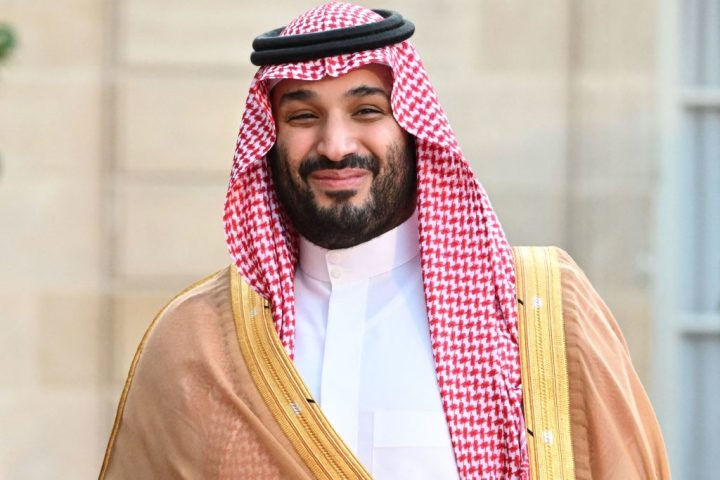Why is the government so keen for Mohammed bin Salman, Saudi Arabia’s crown prince and de facto ruler, to visit Britain? Or, as the television comedian and interviewer Mrs Merton might have put it to Rishi Sunak: ‘So, what first attracted you to the stupendously wealthy Saudi leader?’
Bin Salman’s visit is expected to take place this autumn but as yet there is no firm date. The precise timing will be up to the Saudis, with Britain reduced to playing the part of an anxious host desperate to please.
Global leaders including Sunak appear to have no real measure of the man they’re dealing with
This would be the first visit by the crown prince (universally referred to as MBS) since the murder of the journalist Jamal Khashoggi in 2018. A declassified CIA report concluded that he had authorised the killing, something that he and his government have always denied. At the time, Britain expressed outrage at the murder. Yet here we are, just five years on, apparently delighted to play hosts to MBS and his entourage. Why do it, Rishi?
There are plenty of realpolitik justifications for Britain to hold its nose and sup with the Saudis in London. The desert kingdom is a vital market for British exports. A free trade deal with the wider Gulf bloc is a prize in the offing, with the Saudis carrying an influential say. This could be worth an extra £1.6 billion to the British economy, hardly something to be sniffed at in the current economic circumstances.
There are lucrative prizes on offer for British companies in the services sector too as the desert kingdom seeks to diversify its economy away from oil. And why should Britain not host MBS, given that the Saudis have invested huge sums in sport here through their control of Newcastle United and sponsorship of Formula One?
All this makes sense up to a point – but that doesn’t necessarily make it right. Do principles count for nothing? There’s an argument to be made for dealing with the Saudis at arm’s length, but rolling out the red carpet for an official visit, with all the attendant bells and whistles, is something else altogether.
The visit is guaranteed to spark a storm of protests. Some campaigners will demand that MBS is arrested for human rights violations. This won’t happen, of course, but the pictures of the demonstrations will be beamed round the world.
MBS will be received at Buckingham Palace and King Charles will play a central role. Our royal family has long had close ties to the Saudi royals: Charles has made numerous visits to Saudi Arabia and he has a keen appreciation of Islamic culture and heritage. Even so, the pictures of MBS at the palace will amount to a propaganda coup for the Saudi regime.
Perhaps the crown prince will want to visit St James’ Park to watch his football team play? Unlikely, but why not?
Is there any limit when it comes to rolling out the red carpet for MBS? The Saudis are understandably keen to be seen as big players on the international stage as this helps ‘whitewash’ their human rights record. But should the government be going out of its way to help them in these endeavours?
It is undeniable that MBS, like it or not, is turning out to be the most consequential ruler of the desert kingdom since its foundation. He has quickly succeeded in moving Saudi Arabia away from its traditional subservient relationship with the United States. At the same time he has opened up a new relationship with China, which played a role in the recent reconciliation between Saudi Arabia and Iran.
He is ruthless and unpredictable. Only a few years ago he was hailed as a young and dynamic liberaliser who would open up his country. He has achieved this to some extent, encouraging outside investors and tourism. Women are now allowed to drive. Cinemas and other forms of entertainment, long banned in the Kingdom because they were deemed ‘un-Islamic’, are doing good business.
Yet there is a darker side to his all-powerful rule. Saudi Arabia has never been a free society, but MBS has instituted a climate of fear that is unprecedented. It is dangerous to voice even the mildest criticisms of him or the regime: a post on social media that meets with official disapproval is punishable by arrest followed by a lengthy prison sentence.
MBS’s invitation to London highlights a wider failure of Western politics and diplomacy. Leaders from Biden to Macron, and now Sunak, appear to have no real measure of the man they’re dealing with, beyond chasing access to the huge wealth at his disposal.
History shows that cosying up to the leaders of brutal regimes often yields short term dividends but always comes with a significant price in the long term. Rishi Sunak appears determined to learn this lesson the hard way.







Comments